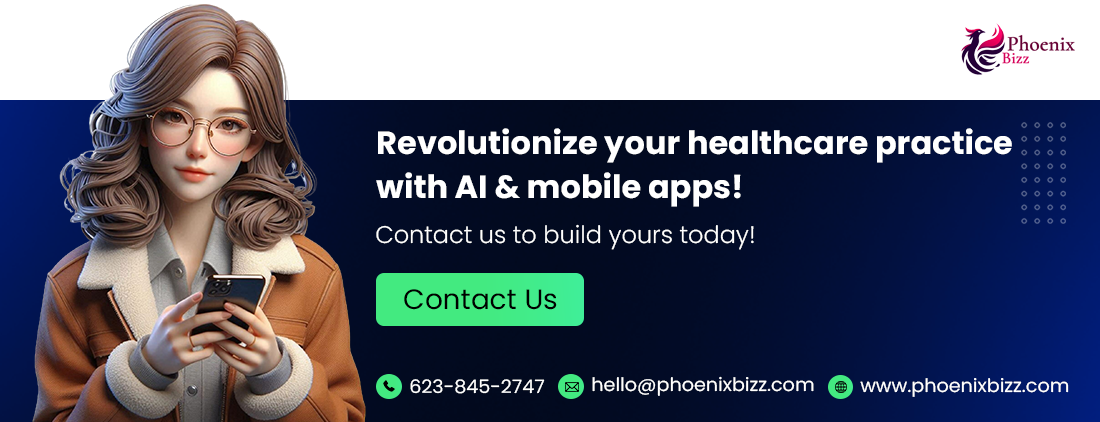October 15, 2024
By: PhoenixBizz Staff Writer
PhoenixBizz is a division of Sofvue, LLC
Printed with permission of Data Titan and Sofvue LLC
Artificial Intelligence has significantly influenced various industries, including healthcare. Medical practitioners and specialists increasingly rely on advanced technologies to keep up with the rapidly evolving landscape. According to a report by Markets and Markets, the global AI-driven medical diagnostics market is expected to generate $3.7 billion by 2028.
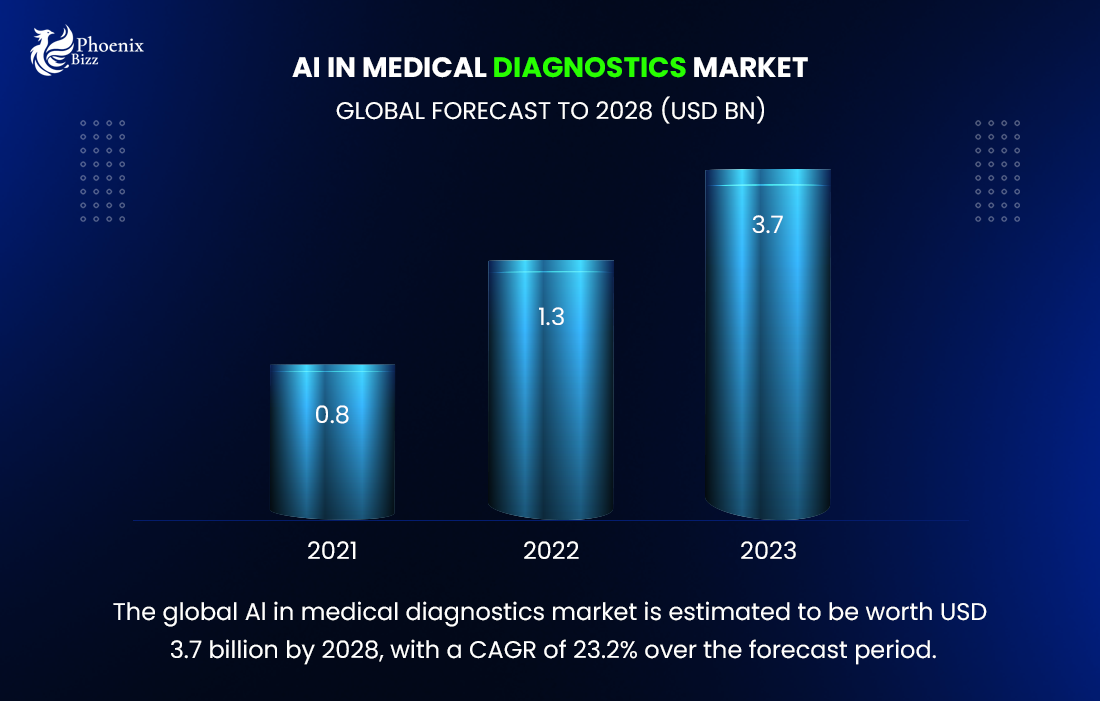
These impressive figures highlight the growing influence of AI in the healthcare industry. AI-powered mobile apps are transforming various aspects of medical practice, from improving patient care and automating billing processes to creating personalized treatment plans. This blog offers an in-depth analysis and accurate insights into how AI and mobile apps are reshaping medical practices, particularly in areas like diagnosis and treatment.
How are AI-driven Mobile Apps being used in Medical Care?
A mobile application powered by artificial intelligence is designed to streamline the daily tasks of medical practitioners, reducing their workload and allowing them to focus on more critical aspects of patient care. These apps function like real-life professionals, capable of interpreting X-ray and MRI reports with high accuracy. Additionally, AI-driven apps can assist healthcare professionals in generating personalized treatment plans by analyzing a patient’s medical history, health status, and other relevant factors, providing tailored solutions for improved care.
Benefits of AI-Powered Apps in the Medical Industry
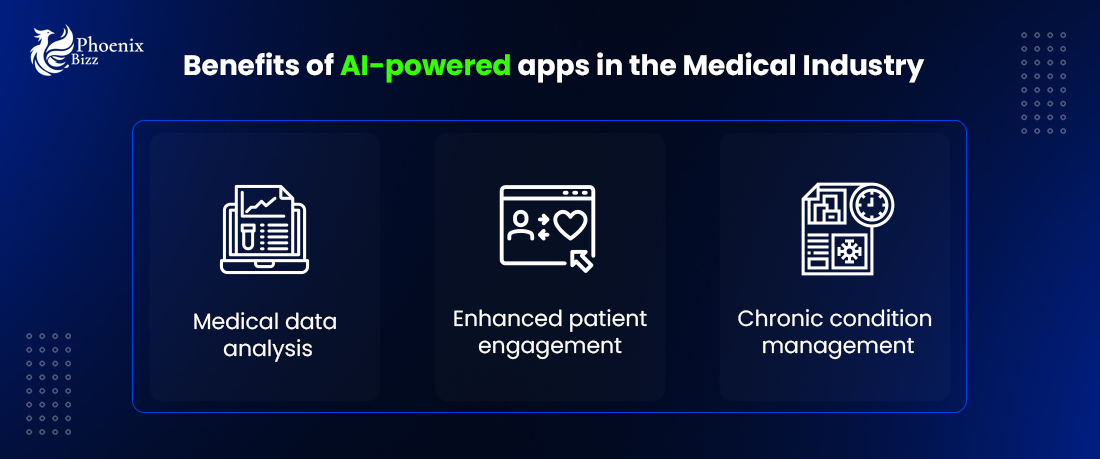
#1. Medical Data Analysis
AI-powered healthcare mobile apps utilize advanced algorithms to analyze complex medical data efficiently. These apps streamline the process, saving practitioners valuable time by offering detailed insights into medical data, treatment plans, and more.
#2. Enhanced Patient Engagement
Mobile apps integrated with AI improve patient engagement by enabling users to monitor their health, receive appointment reminders, and access critical health information. This interaction empowers patients with professional guidance, fostering active engagement and leading to better health outcomes.
#3. Chronic Condition Management
AI-driven mobile apps for chronic disease management offer long-term tracking, regular reporting of physiological parameters, and timely medication reminders. These features help detect potential health complications early and alert both patients and healthcare providers, enabling proactive management of conditions like diabetes, hypertension, and asthma to improve patient health.
Role of AI Healthcare Apps using Medical Diagnostics
Artificial intelligence enhances the accuracy of disease diagnosis by providing critical insights into a patient’s symptoms. With this technology, early detection and timely treatment become more accessible, potentially saving lives. This capability is a key factor in the growing popularity of AI-powered mobile apps in medical diagnostics.
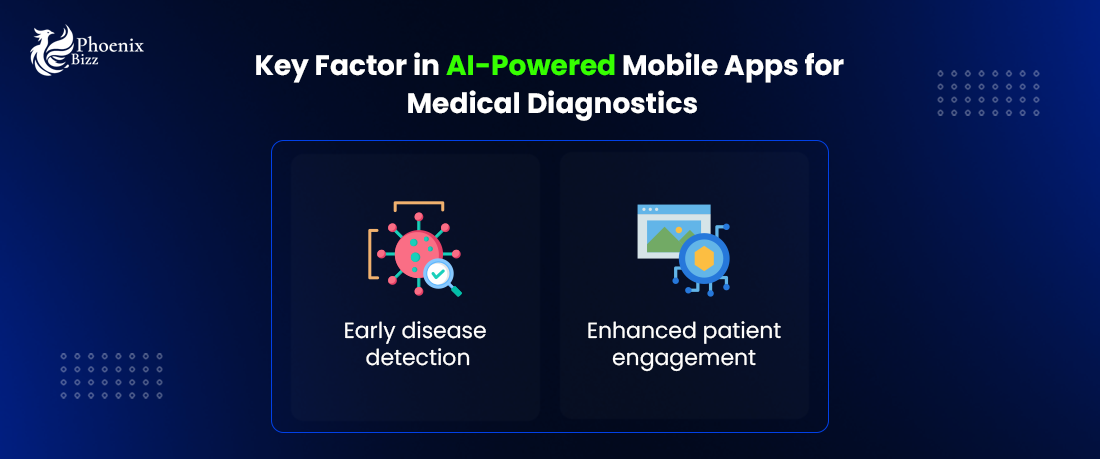
#1. Early Disease Detection
Conditions such as cancer, type 2 diabetes, and chronic kidney disease require early detection for effective treatment. While medical technology continues to advance, incorporating AI accelerates the process. AI-powered healthcare apps utilize advanced algorithms to analyze symptoms, facilitating timely interventions and improving patient outcomes.
#2. AI-Driven Image Analysis
AI apps leverage deep learning, a subset of machine learning, to analyze medical images. This capability aids radiologists and pathologists in detecting abnormalities in medical imaging that might otherwise get missed, and in predicting disease progression by analyzing complex datasets, ultimately supporting more accurate diagnoses.
Role of AI Mobile Apps in Treatment and Lifestyle Management
Healthcare AI applications are transforming patient care by streamlining treatment processes and enabling patients to manage their health more effectively. These apps are revolutionizing the quality of healthcare with a wide range of innovative features.
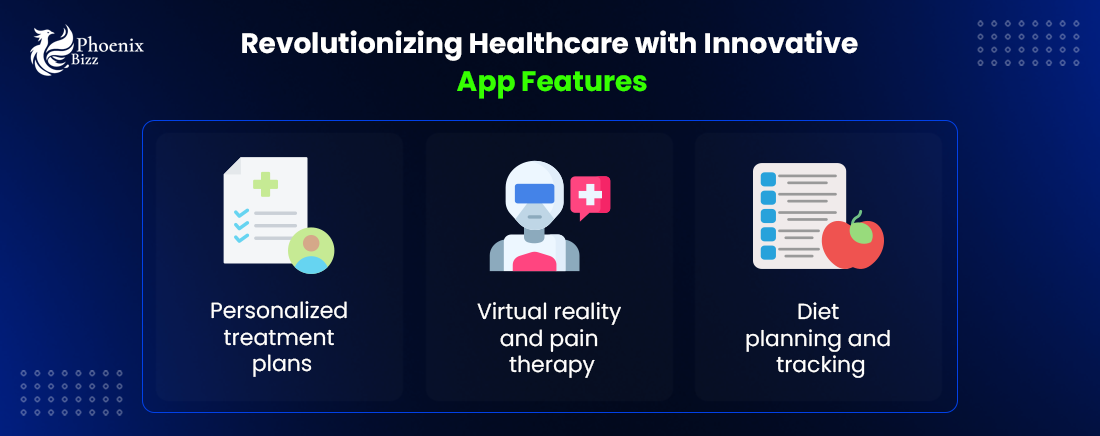
#1. Personalized Treatment Plans
AI algorithms analyze patients' symptoms, medical history, and health reports to develop personalized treatment plans. This allows doctors and healthcare providers to efficiently manage multiple patients, each with unique healthcare needs, ensuring tailored and effective treatments.
#2. Virtual Reality and Pain Therapy
AI-powered apps enhance pain therapy by integrating virtual reality (VR) experiences. These apps offer personalized VR sessions based on patient data, creating immersive environments that help alleviate chronic pain, anxiety, and stress. By providing a non-invasive, drug-free alternative for pain management, patients benefit from an improved mood and higher satisfaction.
#3. Diet Planning and Tracking
AI healthcare apps assist dieticians and health experts in crafting customized diet plans by analyzing patient health data. Whether focusing on a protein-rich diet or creating comprehensive health and fitness regimens, these apps simplify the process. Additionally, AI helps track key metrics like fitness, glucose levels, and overall patient health, supporting continuous, personalized care.
Must Read: How to Build a Healthcare App: A Complete Guide for 2024
AI Mobile Apps for Patient Engagement
AI healthcare apps are streamlining patient engagement, making healthcare more accessible and convenient for both patients and providers.
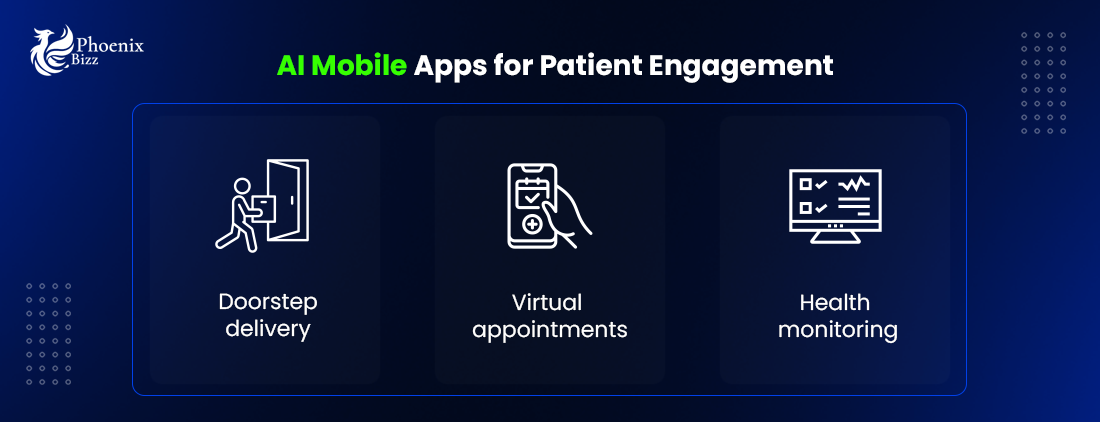
#1. Doorstep Delivery
Healthcare facilities can now accept online orders for medications, enabling doorstep delivery to patients who are unable to visit pharmacies. These apps also send virtual copies of tests, X-rays, and MRIs, eliminating the need for patients to physically visit hospitals or labs.
#2. Virtual Appointments
AI-powered apps allow for instant appointment scheduling and confirmation, reducing the need for in-person visits and alleviating overcrowded hospitals. Patients can book appointments online, making the process faster and more efficient.
#3. Health Monitoring
With a wide array of health monitoring devices available, from smartwatches to AI-enabled apps, patients can track daily metrics like steps, calories burned, and vital signs such as heart rate. These apps use real-time data from sensors to generate detailed health reports, allowing users to stay informed about their overall wellness.
Top Features Needed for your Medical AI Mobile App
Before finalizing your AI-powered healthcare app, selecting the right features is critical to ensuring its success in a competitive market. While many applications are launched, only a few manage to stand out. Here are some key features to consider for your AI-powered treatment and diagnostic mobile app:
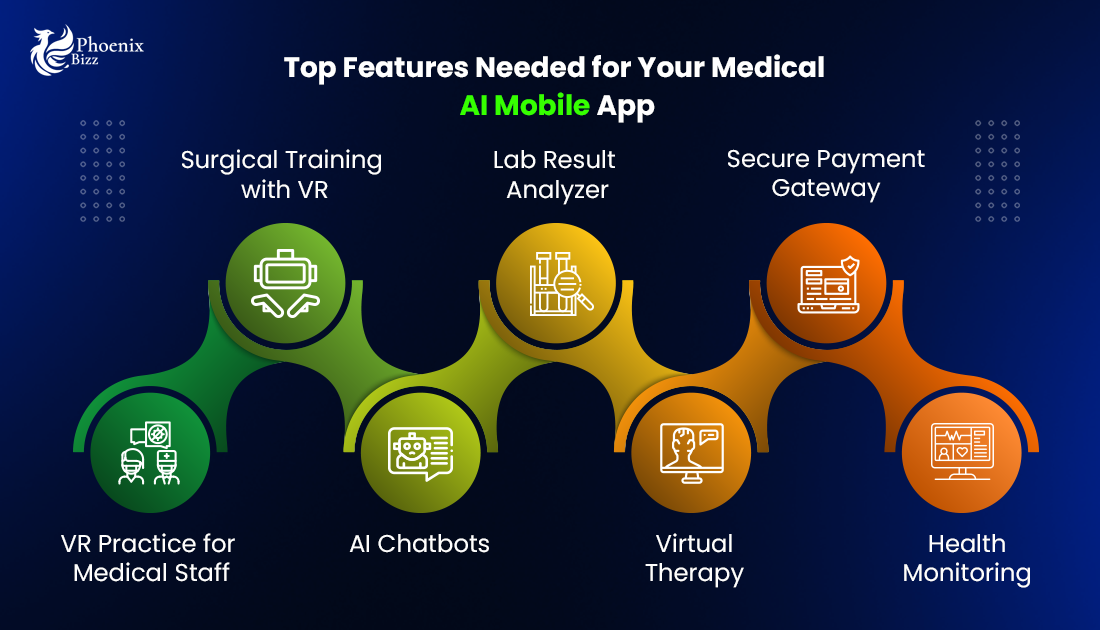
1. VR Practice for Medical Staff
Virtual reality (VR) enables healthcare professionals to simulate medical procedures without real patients. This immersive training improves skills, confidence, and helps reduce the risk of errors during actual treatments.
2. Surgical Training with VR
VR technology offers surgeons the ability to practice various surgical techniques in a virtual environment. It allows them to gain firsthand experience and refine their skills, ultimately leading to better patient outcomes and mastery of complex procedures.
3. AI Chatbots
AI-powered chatbots provide instant customer support, helping patients quickly resolve queries and concerns. These virtual assistants save time by offering immediate responses to basic questions and improving overall user experience.
4. Lab Result Analyzer
AI-driven apps can analyze lab results, saving time for radiologists and other healthcare professionals. While the final diagnosis is confirmed by specialists, the app highlights key findings and concerns, speeding up the diagnostic process.
5. Virtual Therapy
With virtual therapy features, patients have access to on-demand and pre-recorded sessions from psychologists, physiotherapists, and other therapists. This ensures timely treatment and flexibility, even when in-person appointments are unavailable.
6. Secure Payment Gateway
By integrating blockchain encryption and behavioral biometrics, the app can offer secure payment options. AI algorithms further enhance security by detecting and flagging potential fraud through pattern analysis.
7. Health Monitoring
Health monitoring facilitates improved patient recovery by gathering real-time data and sharing it with healthcare providers. This enables early detection of complications and facilitates timely interventions to improve patient outcomes.
Conclusion
The healthcare industry is undergoing a major transformation, thanks to advancements in technology. AI-powered mobile apps are revolutionizing the treatment and diagnostic segments by offering innovations such as virtual therapy, patient monitoring, student health sessions, and even data-driven diagnostic analysis.
From streamlining patient care to predictive analytics, AI-driven apps are improving the accuracy of diagnoses and enabling healthcare professionals to make more informed decisions. Big data and AI also play a crucial role in analyzing patient records, offering insights that can lead to better treatment plans, disease prevention, and personalized care.
Phoenix Bizz is a technology consulting firm specializing in software design and mobile app development for startups and companies with under 200 employees. Over the past two decades, we've helped over 300 businesses in various sectors, including B2B, B2C, and D2C, solve complex technology challenges related to growth and expansion. We are dedicated to supporting small businesses and have earned a reputation for delivering innovative, next-generation solutions.
Our core expertise includes the development of web-based applications, Apple and Google mobile apps, MVPs, prototypes, custom database systems, and websites for small businesses nationwide. With over $23MM in custom software solutions and mobile applications developed, our projects have been featured on major platforms like ABC's Good Morning America, The History Channel, and news outlets across the Southwestern states and Asia.
We offer MVP prototyping for select projects, on-site consulting, and fixed-price contracts with financing options for qualified clients. From bio and fintech to logistics and manufacturing, Data Titan's tailored solutions are trusted by Fortune 500 firms like Fidelity National Financial and The University of Texas, as well as smaller enterprises seeking top-tier software development and mobile app solutions.
How may we serve? Give us a call at 623-845-2747 to talk about your next great project.
Citations:
Markets and Markets: https://www.marketsandmarkets.com/Market-Reports/artificial-intelligence-medical-diagnostics-market-22519734.html
